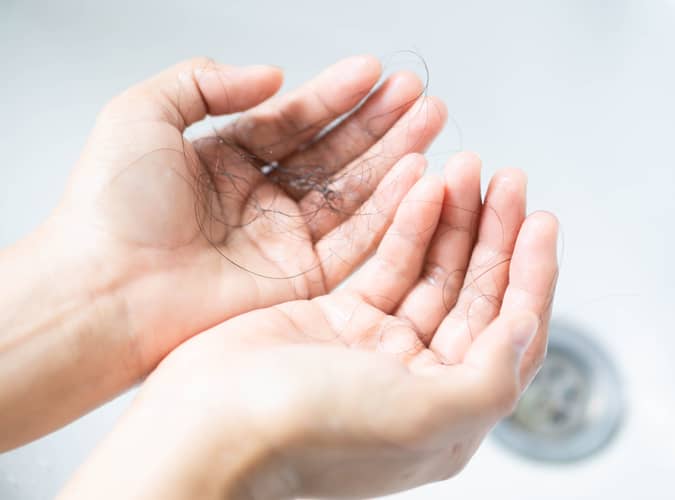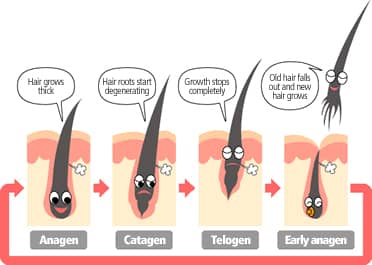Is Covid taking its toll on your hair? 5 best products for hair loss treatment

Have you noticed more hair than usual being lost during lockdown? Here we outline the rationale why this may be occurring at a greater rate than normal along with 5 of the best over the counter hair loss treatments available in Irish pharmacies.
The average human head contains around 100,000 hairs. Naturally, we can lose between 50-100 hairs every day. And while you may not notice it physically in your appearance, it can be a strain mentally if you are aware of hair loss.
Perhaps you may have noticed a considerable increase of hair shedding during lockdown, either in the shower or your hair brush? There are several possible reasons for this – the main ones being stress and a change in routine.
The most common causes of hair loss
There are many reasons why we may shed more hair than usual. The most common causes of hair loss include:
Hereditary hair loss
Both men and women develop this type of hair loss, which is the most common cause of hair loss worldwide. In men, it’s called male pattern hair loss. Women get female pattern hair loss too. Regardless of whether it develops in a man or woman, the medical term is androgenic alopecia. No matter which term you use, it means that you’ve inherited genes that cause your hair follicles (what each hair grows out of) to shrink and eventually stop growing hair. Shrinking can begin as early as your teens, but it usually starts later in life. In women, the first noticeable sign of hereditary hair loss is usually overall thinning or a widening part. When a man has hereditary hair loss, the first sign is often a receding hairline or bald spot at the top of his head.
Stress and Anxiety
Cortisol, the stress hormone, makes the hair that is already grown move into the telegen phase part of the cycle more quickly (see below). Some stress sufferers also develop the habit of playing with their hair, or even pulling it out completely, as a coping mechanism. This is called trichotillomania and this will remove hair or weaken it as well. Stress can also cause problems with appetite, and if you aren’t consuming enough vitamins and minerals your hair will become weak and fall out more readily.
Mineral deficiencies
Too little biotin, iron, protein, or zinc. If you’re not getting enough of one or more of these minerals, you can have noticeable hair loss.
Lifestyle choices such as smoking
While many people who smoke don’t notice any considerable hair loss, the habit can cause issues and may exacerbate hair loss for some people, particularly if they are already suffering from stress, hormonal changes, or illness.
Cancer treatment
If you receive chemotherapy or have radiation treatment to your head or neck, you may lose all (or most of) your hair within a few weeks of starting treatment.
Medication (side effects)
A possible side effect of some medications is hair loss. If you think a medication is causing your hair loss, ask the doctor who prescribed it if hair loss is a possible side effect. It’s essential that you do not stop taking the medication before talking with your pharmacist or doctor. Abruptly stopping some medications can cause serious health problems.
Childbirth or illness
A few months after giving birth, recovering from an illness, or having an operation, you may notice a lot more hairs in your brush or on your pillow, most likely due to the physical stress that your body has experienced.
Age
With age, most people notice some hair loss because hair growth slows. At some point, hair follicles stop growing hair, which causes the hair on our scalp to thin. Hair also starts to lose its color. A woman’s hairline naturally starts to recede.
Hormonal Imbalance
The male sex hormone known as testosterone, which is present in both men and women, plays a vital part in the maintenance of hair. Testosterone is converted into dihydrotestosterone which can cause hair follicles to become inactive – hair will no longer grow. When women go through the menopause they will produce less oestrogen and more testosterone. In turn, the testosterone will be turned into dihydrotestosterone (DHT), which can effect the hair follicles and cause your hair follicles to shrink. In men also the increase in conversion of testosterone to DHT by the enzyme 5-alpha reductase results in weakening of hair follicles and not reproducing any further hair growth.
A common cause of this imbalance is polycystic ovary syndrome (PCOS). It leads to cysts on a woman’s ovaries, along with other signs and symptoms, which can include hair loss.
Hair Loss Cycle
There are 3 phases to a hair loss cycle in losing some hair – around 100 strands per day. These are namely:
- Anagen Phase – This is the growth phase, and it is the time between the start of hair grown and when the hair reaches its full length.
- Catagen Phase – This is the transitional phase and lasts roughly 10 days and is when your hair begins to get weaker.
- Telogen Phase – This is where the hair growth stops completely and prepares to fall out. The follicle left behind will not grow hair again for around 3 months, and after this the cycle repeats itself.
Is hair loss a symptom of long Covid?
There has been a lot of discussion around whether hair loss is joining the list of post covid conditions. The USA’s Centers for Disease Control (CDC) now lists hair loss as a symptom reported by Covid-19 patients and said it will “continue active investigation and provide updates as new data emerge”.
A study was carried out in Jin Yin-tan Hospital in Wuhan last year and has been published in The Lancet Journal. 359 of 1,655 people or 22 per cent – reported losing hair in the six months post Covid. This has been found to be due to a condition known as Telogen Effluvium (TE), a form of temporary alopecia or hair loss caused by hormonal stress or severe systemic infections.
Under normal circumstances, about 10% of your hair is in a resting phase, 5% in a shedding phase and the rest in a growth phase. But if your body experiences an extreme infection of any kind, the body shifts its energy to focus and prioritize life-sustaining function. Hair growth is not necessarily a survival function. So potentially 30- 50% of your hair would shift to the resting phase. That phase usually lasts two to three months, and then it naturally sheds. Patients may notice clumps of hair on their brushes, after this time,more than what you’d usually experience. And it’s the delayed reaction which makes it difficult to decipher if this is due to the delay or Covid.
The current consensus is that it TE is a temporary condition, but nonetheless, it is something that will continue to be monitored.
I haven’t had Covid so why am I experiencing hair loss?
Here are possible reasons:
- Extra Stress – Lockdown and the uncertainty around Covid 19; being stuck to a 5km radius, home schooling, juggling work and financial pressures will have caused a lot of stress on many people. This is likely to be the main cause of any shedding or hair-loss. Reducing the stress in your life is perhaps easier said than done, but it is something to look into more thoroughly, with expert help, if this is an issue.
- Hair Care – The causes of hair loss begin much deeper down than any hair care product can reach – it starts in the very roots and follicles. However, using the wrong shampoo and conditioner for your hair type can cause your hair to look thinner, even if it is not. If you need to, find a hair growth shampoo and conditioner. During lockdown, when hair salon visits are no longer available to us, many people may have let their usual hair routine lapse. They might also have pulled it into a ponytail or bun more often, which can also cause tension on the scalp and follicles. A hot shower is also bad for your hair, making it brittle and dehydrated. So when washing your hair, turn the temperature down a little so that you are using warm water instead of hot. Interestingly, not washing your hair enough can cause hair loss. The build-up of grease and dirt can cause follicles to become weak and even inactive. Using hot tools on your hair including straightening irons and hair dryers can dry out the strands and lead to hair loss. Don’t use these tools every day, but instead use them two or three times a week. This will help your hair to become stronger. While hair styles can be expressive of your personality, they can pose a threat to your hair. Over time, mechanical stress on hair strands can damage hair follicles. Hair styles such as extensions, buns, ponytails, cornrows and other hair styles which pull your hair back can cause stress on your hair follicles.
- Smoking – People who smoke regularly are likely to have increased their daily amount while in lockdown due to boredom or stress. And this may in turn have increased shedding and may be the main cause of any considerable hair loss. Smoking can cause issues with circulation, too. Your blood carries vitamins, nutrients and, most importantly, hormones around your body. So it’s understandable that poor circulation can affect the amount of nutrients delivered to your hair follicles and affect hair growth. This can mean that your scalp is unable to get enough blood to it to form complete follicles and grow hair, and it can weaken the follicles that are already there. Quitting smoking is an excellent idea for many reasons and if you are particularly prone to hair loss it may help you.
The best 5 hair loss treatment products to help encourage hair growth and prevent hair loss
Regaine – has been available over the counter now for several years in Irish pharmacies and is still one of the first remedies in terms of treatment for hair loss and prevention. Regaine contains the active ingredient minoxidil, which is scientifically proven to help stop and reverse hereditary hair loss. It works by increasing the supply of blood and nutrients to your hair follicles helping to strengthen the existing hairs and encouraging them to grow. Minoxidil’s full mechanism is not quite fully understood, but it can help reverse the hair loss process of androgenetic alopecia be the following means:
- Reverses the miniaturisation of the follicles
- Increases blood flow around the follicles
- Stimulates follicle movement to growth phase of the hair cycle
- Extends each follicle growth phase
Regaine is available as a foam or a topical solution which is directly applied to the hair. Minoxidil is suitable for both men and women.
Bioxsine Dermagen – These range of herbal products were developed for both men and women who suffer from hair loss. In the majority of cases, the clinically tested active ingredient Biocomplex B11 stabilises hair loss and stimulates the growth of new hairs. The herbal solution offers stronger, healthier, thicker and fuller looking, more beautiful hair. Clinical tests in three different universities in Italy, Germany and Turkey showed that after 2 months use, hair loss was prevented in 90% of cases and an increase in hair growth was found in 80% of participants involved in the studies. These studies used a combination of regular use of both the serum and shampoo.
Viviscal – is the UK’s most clinically researched hair supplement brand. Its supplements are suitable for both men and women. They are scientifically formulated with biotin and zinc to help maintain health hair from within. Viviscal is the only hair supplement brand that includes the proprietary marine protein complex AMinoMar C originating from Scandinavian research. Biotin or (Vitamin B7) helps the body to absorb amino acids which are the building blocks of protein, an essential nutrient for the maintenance of normal hair
Biotin – is a water soluble vitamin also known as vitamin B7 or H. It is needed by your body to help convert certain nutrients into energy along with playing an important role in the health of your hair, skin and nails. If you aren’t getting enough biotin, you may experience hair loss or a scaly red rash (commonly when associated with seborrheic dermatitis). Keratin is a basic protein that makes up your hair, skin and nails. It is clear that biotin improves your body’s keratin infrastructure and this should help make hair stronger as a result. In a 2015 study, women with thinning hair were given an oral marine protein supplement containing biotin or a placebo twice daily. Comparisons were made with digital images taken at the beginning and the end of the study. The researchers found that women who took the supplement experienced a significant amount of hair growth in the areas affected by hair loss. They also had less shedding. Another 2012 study by the same researchers produced similar results. Participants in that study noticed an improvement in growth and quality of hair growth after 90 and 180 days respectively.
Nourkin – is a supplementation that has undertaken more than 56 scientific studies and clinical papers as well as several consumer studies published in peer-reviewed journals over the last 30 years. Nourkin for both men and women contains a bioactive proteoglycan complex known as Marliex which helps to support, normalise and maintain the hair growth cycle. This part of the 3 phase of the hair cycle ordinarily gets shortened during times of hair loss while the telogen phase (dormant) gets lengthened.
Whilst the treatments mentioned may help to delay or reverse the onset of hair loss, in more severe cases there are other options to dwell on.
Wigs, hair pieces and toupees are the simplest treatments for both men and women. They can range in price so it’s worth doing plenty of research, as some may need to be replaced regularly, and deciding to use synthetic or real hair pieces may need expert advice.
Hair Transplantation is another option, though these are only available from private clinics and are quite expensive depending on the severity of hair loss. In addition, they are only suitable for people with hereditary baldness and not for people with patches of balding (alopecia areata).
For men only – there is also a prescription medicine called Finasteride, which is taken daily to slow down the hair loss cycle.
While the above article gives you some insight into the causes and treatments of a hair loss it is important to speak directly with a pharmacist or doctor to identify the possible root cause to your hair loss issue. Practical advice for managing stress and anxiety is readily available for those affected during these very difficult times. So don’t be afraid to reach out when needed and we will help out where we can or direct you to more expert advice if deemed necessary.

